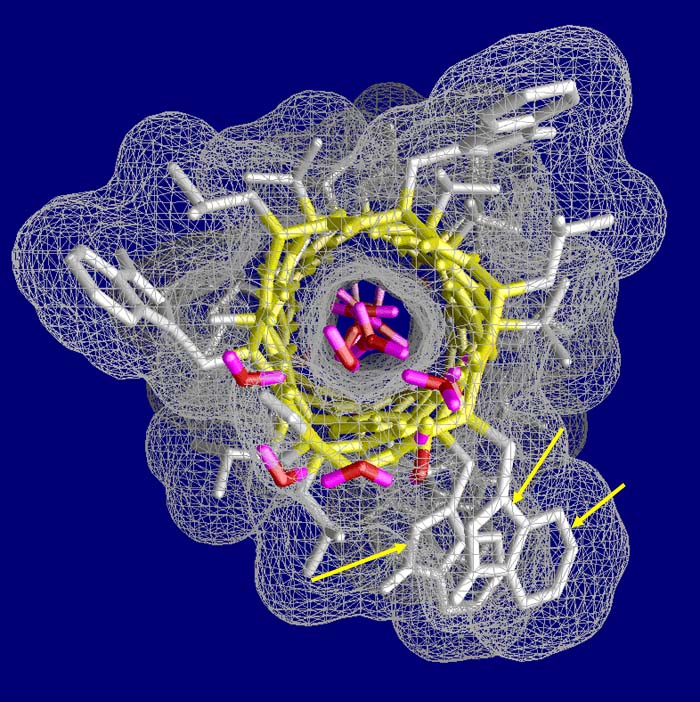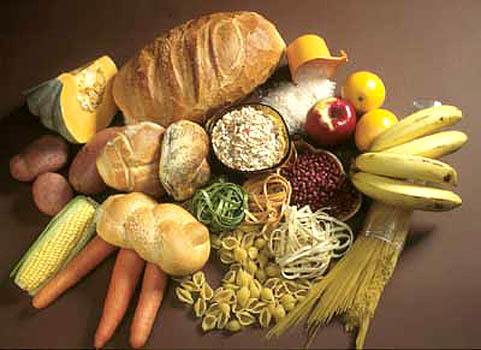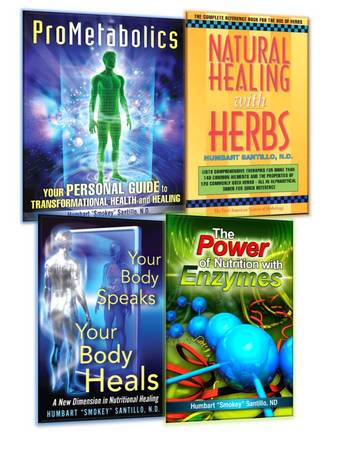|
Facts About Protein
|
 Protein in Greek means "primary
importance." Your body digests protein and breaks it down into amino acids.
There are 22 amino acids; nine are essential--meaning your body can't
manufacture them. They come by way of foods. The other 14 are assembled or
disassembled by the liver. From these 22 amino acids your body makes over
50,000 other amino acids. So your first line of defense is proper digestion so
the amino acids get to the liver. Then your liver humanizes or reconstructs the
amino acids into proteins your body can use. This means the protein is
personalized and recognized so your body can accept them and build body parts.
If your body cannot recognize them, they can become an allergen, become toxic,
acidify the body, and overwork your immune system. This can lead to an
inflammatory disease like arthritis and fibromyalgia. It can also cause
lymphatic congestion and inhibit the removal of toxins. A high protein diet
suggested years ago at 200 grams a day with poor quality protein can cause
osteoporosis and kidney and liver damage. A low protein diet promotes a
Protein in Greek means "primary
importance." Your body digests protein and breaks it down into amino acids.
There are 22 amino acids; nine are essential--meaning your body can't
manufacture them. They come by way of foods. The other 14 are assembled or
disassembled by the liver. From these 22 amino acids your body makes over
50,000 other amino acids. So your first line of defense is proper digestion so
the amino acids get to the liver. Then your liver humanizes or reconstructs the
amino acids into proteins your body can use. This means the protein is
personalized and recognized so your body can accept them and build body parts.
If your body cannot recognize them, they can become an allergen, become toxic,
acidify the body, and overwork your immune system. This can lead to an
inflammatory disease like arthritis and fibromyalgia. It can also cause
lymphatic congestion and inhibit the removal of toxins. A high protein diet
suggested years ago at 200 grams a day with poor quality protein can cause
osteoporosis and kidney and liver damage. A low protein diet promotes a
weak
immune system, deficiencies, and weak tissue integrity.
Amino
acids are required by every cell in your immune system, antibodies, endocrine
hormones, cellular matrix, the material between cells, and collagen, the
insoluble protein found in connective tissue, skin, bones, ligaments, and
cartilage. Collagen represents 30% of the total body protein. Imagine all the
problems in these areas if the proper protein is absent. Thousands of enzymes
are made from amino acids. So we know the importance of getting the proper
amount of protein. We'll soon see getting the right kind of protein is more
important than just quantity. The key is how to use protein. You can get more benefit
out of less protein so there's less body stress, less toxicity, and your body
will become more efficient.
Some
of our protein problems often avoided and not even looked at are:
- Digestive enzyme deficiencies = poor digestion.
- Poor quality protein coupled with incomplete digestion.
-
Poor food combining.
-
Not enough vegetables to buffer acidification.
-
Too much complex protein like meat and raw nuts which
can be hard to digest.
-
Not enough exercise.
-
Too many carbohydrates which can result in not enough
protein in the diet.
|
|
Carbohydrates in the Diet
|

In the 1980's a
high carbohydrate diet was promoted. The results of this type of diet left
these advocates deficient in protein, and with poor quality tissues and hormonal
imbalances. A high cooked grain diet can become allergenic, especially if fruit
and vegetables are neglected. Another factor is that most of these grains are
hybridized and loaded with herbicides, pesticides, gasses, and chemical
fertilizers.
The dry weight of
the body is 70% protein. Bones, skin, collagen, immune system, and hormones are
based on protein and must be renewed daily. Six to 12% of the dry weight is
carbohydrates in the body and they must be kept in transit and utilized for
energy. Grains, potatoes, pasta, and cereals can short change the body. A high carb
diet may reduce protein toxicity, but is not in accord with the body matrix.
They may give superficial energy, but turn to sludge in the body and produce a
breeding ground for bacteria and increased triglycerides (fat), especially if they are simple carbs or highly processed. Excess sugar converts to
high triglycerides in the body and creates other problems. The only people who
need higher carbs in their bodies are athletes and children. Children are
growing with high energy systems and athletes are working their bodies.
Athletes that use too much protein and carbohydrates heal slowly and have poor
tissue integrity coupled with acidosis.
Mother's
milk is often used as a standard for these foods. It's high in carbohydrates,
but the metabolic differences between an adult and an infant are not taken into
consideration. Infants need carbs to put on weight. Adults need hormonal,
immune, and tissue integrity and need a proper balance between foods.
Proponents
of a low protein-high carbohydrate diet say protein is toxic and causes colon
problems and even cancer. Authorities of a high protein diet with low
carbohydrates say that high carbs create diabetes I and II, high cholesterol,
and hyperinsulinism. We now have what we call syndrome X which is all the
different diseases of the pancreas which can be resultant from a high carb
diet.
|
|
The Protein Carbohydrate Solution
|

Both of these groups of thinkers
are right. So what's the solution? The solution is high quality low stress
protein, prepared properly, in the right amounts, combined properly with
vegetables and eaten at the right time of day. The quality of protein is very
seldom considered. If protein foods are cooked, digestive enzymes should be
taken with meals. Poor quality protein results in digestive stress, poor
digestion, and poor elimination of toxic wastes. It's all about how your body
handles the foods you eat. Your body is made out of the food that is usable,
not necessarily what you consume. People that eat a high protein diet are
alarmed when they see protein deficiencies. It's because of one or more of the
reasons given. Thirty grams of usable protein is better than 100 grams of unusable protein which can
cause the given problems. The RDA suggests for a 155 lb. male, 56 grams of
protein daily, and a female at 120 lbs., 44 grams of protein daily. Excessive
body fat can increase weight but that doesn't indicate more protein is needed.
Not in my book. During pregnancy, a mother can increase high quality protein to
50 grams per 100 lbs. of body weight. But all of us should monitor saliva and
urine pH to see how our bodies are handling the foods we eat. Please see the
monitoring system in my book, ProMetabolics.
Then you'll know for sure if you're digesting these foods or if they're causing
problems. We're all different; monitoring is knowing for sure. Sixty
to 70% of the diet can be vegetables. Use a variety of vegetables with a variety
of colors. The average person can consume 25-40 grams of protein a day. Two
important points here. A clean detoxified body, all systems working well, will
better utilize and need less food than someone who's toxic. Secondly, it's the
quality not quantity that's more important coupled with preparation.
You
can get enough quality carbs from your vegetables. You can use whole grains,
especially spelt, if need be. The best way to use grains is sprouting them or
buying sprouted bread. Steam them if need be. You need very little grains if
you're not working out.
My
next newsletter will cover proper foods to use. This article is long enough.
Talk to you next month.. |
| Books by Dr. Smokey Santillo
|

Dr. Smokey Santillo's latest book, ProMetabolics, and his classics Food Enzymes and Natural Healing with Herbs are all available through his publisher Designs for Wellness Press with Dr. Roy Vartabedian. Click HERE to order your copy of these highly informative and practical publications today.
|
|